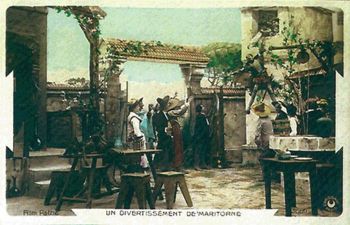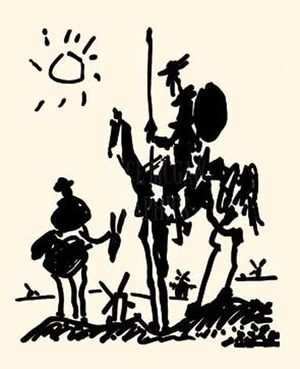Don Quixote
 From Conservapedia
From Conservapedia Don Quixote (Don Quijote in modern Spanish; pronounced 'key-ho-tay' or sometimes 'quick-sut'[1]) is a tragi-comic novel by Miguel Cervantes, written in two parts in the late 16th and early 17th centuries. It is one of the most important Spanish literary works, and is often considered to be both the first modern novel, and one of the greatest novels of all time.
The novel is a satirical work, based in no small part on the glorification of knights and knightly virtues, orthodoxy, nationalism and national pride, aristocracy, and ultimately meaning in life. While the first half of the work reads as almost pure farce, the second half explores the more deep and psychological questions of meaning in life, place in the world, self-identity and self-fulfillment, societal roles, and in no small measure, madness itself.
Contents
Characters[edit]
The novel's protagonist, Don Quixote, is a minor aristocrat who has read rather too many books about chivalry and imagines himself a knight battling supernatural and mythological beings, despite living in a mundane environment where they do not exist. He is aided by a faithful squire named Sancho Panza, who has sincere respect for his master, and believes that he will be richly rewarded for his faithful service. However, all other characters in the book are able to see Don Quixote for what he is - a deluded and rather pathetic middle-aged man.
Other key characters are Rocinante, Don Quixote's ageing horse; Dulcinea de Toboso, the lady whom Don Quixote claims to serve in the chivalric tradition (although she is eventually revealed to be an uncouth peasant girl whom he barely knows); and Cide Hamete Benengeli, a Moorish writer whom Cervantes claims originally wrote the story, his version being a translation from the Arabic.
Most of the other characters mock Don Quixote, but he has three loyal friends apart from Sancho: the barber and priest from his home village, and a young man named Sanson Carrasco. The three are deeply worried about their friend, and make efforts to cure him of his madness and persuade him to return home. Eventually, Carrasco hits on the ingenious idea of dressing up as a rival knight and challenging Quixote to a joust, on the condition that he renounces his knightly ways for good. This works at the second attempt - Quixote manages to win the joust the first time.
Themes[edit]
The humor derives from Don Quixote's ability to contort everything he sees to a demented world view based on silly books - however it is a measure of Cervantes' skill as an author that we come to sympathize with Don Quixote more than those who mock him, as much as the latter may be correct.
Don Quixote's modernity lies partly in its self-referential and intertextual nature. The impetus for the story comes from other works of fiction, whose conventions Cervantes adopts and subverts for satirical effect. In part two of the book, these tricks are increased, as Quixote meets people who already know of his doings from having read part one, and also pokes fun at an 'unofficial' part two that had circulated between the publication of the first and second parts. These kinds of literary tricks were new at the time of writing, and proved to be enormously influential; examples include Tristram Shandy and countless postmodern writers of the 20th century.
Influence[edit]
The episode most often remembered by readers of Don Quixote is the instance when he attacks several windmills, thinking that they are giants. The phrase 'tilting at windmills' has come to describe anyone who engages in a futile endeavour.
Don Quixote has provided inspiration for numerous artists and illustrators. For example, one of Pablo Picasso's most famous works is a black and white inking of Don Quixote. However, there has never been a successful cinema adaptation. The director Terry Gilliam chronicled his unsuccessful attempts to film Don Quixote in the documentary Lost in La Mancha (2002).[2] Despite a succession of failed attempts at cinematic productions, Don Quixote has been successfully adapted into a musical titled Man of La Mancha.
References[edit]
Categories: [Novels]
↧ Download as ZWI file | Last modified: 02/06/2023 13:22:10 | 31 views
☰ Source: https://www.conservapedia.com/Don_Quixote | License: CC BY-SA 3.0
 ZWI signed:
ZWI signed:

 KSF
KSF